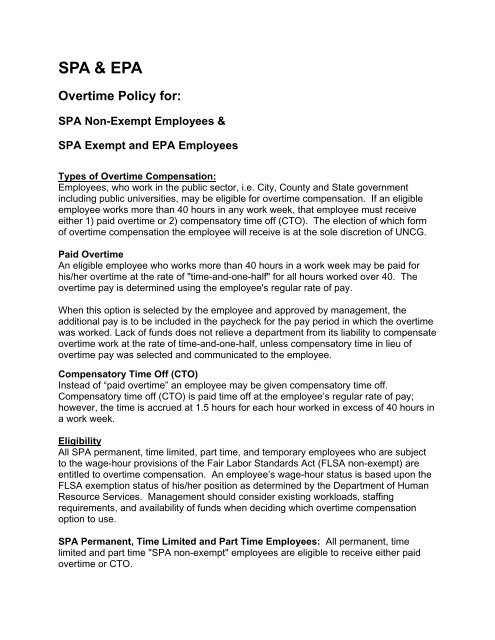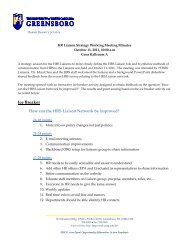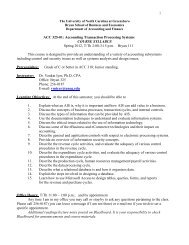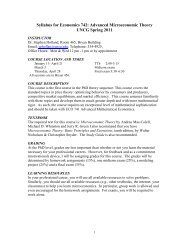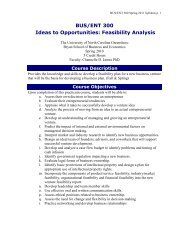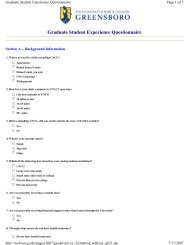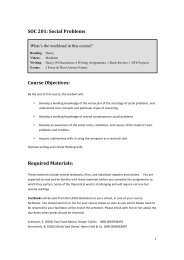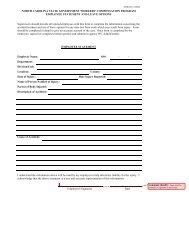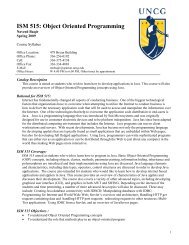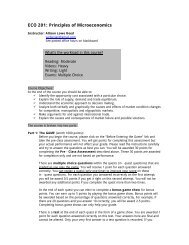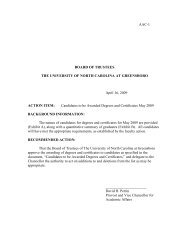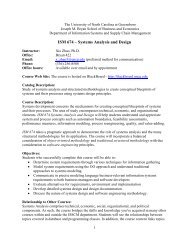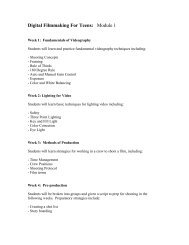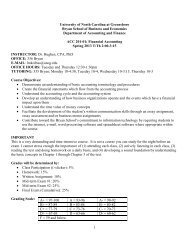January 19/20, 2010 Minutes/Docs (.pdf)
January 19/20, 2010 Minutes/Docs (.pdf)
January 19/20, 2010 Minutes/Docs (.pdf)
You also want an ePaper? Increase the reach of your titles
YUMPU automatically turns print PDFs into web optimized ePapers that Google loves.
SPA & EPAOvertime Policy for:SPA Non-Exempt Employees &SPA Exempt and EPA EmployeesTypes of Overtime Compensation:Employees, who work in the public sector, i.e. City, County and State governmentincluding public universities, may be eligible for overtime compensation. If an eligibleemployee works more than 40 hours in any work week, that employee must receiveeither 1) paid overtime or 2) compensatory time off (CTO). The election of which formof overtime compensation the employee will receive is at the sole discretion of UNCG.Paid OvertimeAn eligible employee who works more than 40 hours in a work week may be paid forhis/her overtime at the rate of "time-and-one-half" for all hours worked over 40. Theovertime pay is determined using the employee's regular rate of pay.When this option is selected by the employee and approved by management, theadditional pay is to be included in the paycheck for the pay period in which the overtimewas worked. Lack of funds does not relieve a department from its liability to compensateovertime work at the rate of time-and-one-half, unless compensatory time in lieu ofovertime pay was selected and communicated to the employee.Compensatory Time Off (CTO)Instead of “paid overtime” an employee may be given compensatory time off.Compensatory time off (CTO) is paid time off at the employee’s regular rate of pay;however, the time is accrued at 1.5 hours for each hour worked in excess of 40 hours ina work week.EligibilityAll SPA permanent, time limited, part time, and temporary employees who are subjectto the wage-hour provisions of the Fair Labor Standards Act (FLSA non-exempt) areentitled to overtime compensation. An employee’s wage-hour status is based upon theFLSA exemption status of his/her position as determined by the Department of HumanResource Services. Management should consider existing workloads, staffingrequirements, and availability of funds when deciding which overtime compensationoption to use.SPA Permanent, Time Limited and Part Time Employees: All permanent, timelimited and part time "SPA non-exempt" employees are eligible to receive either paidovertime or CTO.
SPA Temporary Non-Exempt Employees: All SPA temporary non-exempt employees,including student employees, are eligible to receive paid overtime only; they cannotreceive CTO.SPA Exempt and EPA Employees: This applies to UNCG faculty, EPA non-faculty,and SPA staffs (permanent and temporary) that are exempt from the wage and hourprovisions of the Fair Labor Standards Act (FLSA).In order to be exempt from the wage and hour provisions of the FLSA an individual mustbe employed in a bona fide executive, administrative or professional capacity. Suchemployees do not submit monthly time sheets.Members of the faculty and staff whose duties and responsibilities are such that they (1)are determined to be exempt from the wage and hour provisions of the FLSA, and (2)earn annual/vacation and sick leave, are expected to account for periods of time awayfrom work by submitting an approved UNCG Monthly SPA/EPA Exempt Leave Reportto their departmental time keeper for input into the Banner HR system by the first ofeach month for any time off during the previous month.While work schedules for exempt employees are not strictly defined, employees areexpected to devote sufficient hours to ensure their job duties are accomplished in aprofessional manner and they are available during the regular operating hours of theuniversity. Generally, exempt employees work hours in excess of the “normal” 40 hourwork week that non-exempt employees devote to their jobs. Vacation and sick leaveare to be accounted for in full day increments on the prescribed monthly leave reportand entered into the Banner HR data management system. Less than full time exemptemployees, who earn leave, are expected to account for their leave time on a pro-ratabasis, depending on the specific terms of their employment.Members of the faculty and staff who are exempt from the wage and hour provisions ofthe FLSA do not receive additional compensation or CTO from the University when theywork more than forty hours in a work week (or the corresponding number of hours forless-than-full-time employees). However, the University recognizes that there areoccasions when FLSA exempt employees may work a significant number of hoursbeyond the “standard” work week of forty hours (or the corresponding number of hoursfor less-than-full-time employees).In exceptional circumstances, an employee, who is exempt from the FLSA and whoseduties require work in excess of forty hours (or the corresponding number of hours forless-than-full-time employees) in a peak work period or on a special project, may, withapproval of his or her supervisor, be allowed to a take an agreed upon amount of timeaway from work. This should occur in rare instances and only when the employee hasput in extraordinary hours beyond their general work time. This time away from workshould generally be taken within a period of two weeks after the peak work period orproject is completed.For questions about this policy, please contact the EPA-HR Office for EPA employeesand the Department of Human Resource Services for SPA employees.
Determination of Overtime CompensationIt is management's sole discretion whether to permit or require an eligible employee towork more than 40 hours in any work week and thus, provide either overtime pay orCTO based upon availability of funds and/or operational needs of the work unit.Eligible employees earn time-and-one half for all hours worked in excess of 40 hours ina work week. An employee must actually work over 40 hours to earn overtimecompensation. Paid time that is not considered time worked (e.g., vacation, sick leave,administrative leave and most other types of leave or paid time off) does not count astime worked for the purpose of determining employee eligibility for overtimecompensation.Working more than eight hours in a work day does not necessarily constitute overtime.Overtime occurs only after working more than 40 hours in a work week. The work weekat UNCG is defined as 12:01 AM Sunday morning to 12:00 Midnight Saturday night.Management should give as much advance notice as possible of the need to workovertime so that employees can make any personal time arrangements necessary toenable them to perform the overtime work.Note: Some work units may require occasional or regular mandatory overtime as acondition of employment. Such a requirement should be explained to job candidatesprior to an offer of hire during the recruitment and selection process.Gap HoursFor SPA permanent non-exempt employees whose regular work schedule is less than40 hours per work week, gap hours are those hours that are caught in the gap betweenthe hours of work required to meet the work schedule and 40 hours during the definedwork week. For example, if a permanent part-time employee is required to work <strong>20</strong>hours a week, any hours worked between <strong>20</strong> and 40 would be considered “gap hours.”For SPA permanent non-exempt law enforcement employees whose regular workschedule is 28 days, gap hours are those hours that are caught in the gap between 160hours and 171 hours worked before overtime compensation begins.Gap hours can also occur during a workweek when a SPA permanent non-exemptemployee takes a holiday, civil leave, or other management approved leave that is notoffset by hours worked in the same workweek. Example: if a full-time employee has aholiday on Monday, but also works 40 hours in the same workweek as the holiday. Theemployee will receive 8 hours pay for the holiday, 32 hours regular straight-time pay,and 8 additional gap hours compensation.Employees shall receive straight time pay for the gap hours worked with the provisionthat the University has the option of providing cash payment or CTO on an hour for hourbasis for gap hours worked. The decision to pay cash versus CTO shall be at the sole
discretion of management. The Chancellor, or Chancellor’s designee, shall determinethe best method of compensation for gap hours worked based on consideration ofavailability of funds and/or organizational needs of the department. The decision to paycash versus CTO should be applied consistently throughout a division or departmentwith approval of the Vice Chancellor. The Chancellor or Chancellor’s designee shallreport the compensation method used to the Office of State Personnel. Exceptions tothe agency’s chosen compensation method must be reviewed and approved by theOffice of State Personnel. UNCG’s preferred method of overtime compensation for GapHours worked is CTO.The following provisions apply to Gap Hours CTO:• Gap hours CTO cannot be merged with regular CTO or any other compensatory leaveaccounts.• There is no maximum accumulation for gap hours CTO. The University may choose topay out accumulated gap hours CTO at any time based on availability of funds and /ororganizational needs.• Gap hours CTO shall be taken before any vacation or bonus leave. (Exceptions maybe made for retirees who may need to exhaust vacation leave prior to retirement.)• Gap hours CTO shall be taken within twelve months from the date the work isperformed. If not taken within 365 days, the time shall be paid out in the next paycheck.• If an employee separates before taking gap hours CTO, it shall be paid in a lump sumalong with unused vacation.• If an employee transfers to an SPA exempt or EPA Exempt position or to another stateagency or university before taking gap hours CTO, it shall be paid in the current or nextregular paycheck by the releasing agency.Note: Temporary non-exempt employees or other hourly non-exempt employees whoare in a non-leave earning appointment type shall receive straight time monetarypayment for a standard 40-hour workweek, and an additional amount equal to 1½ timesthe employee’s regular hourly rate for all hours worked in excess of 40. Also, temporarynon-exempt Law Enforcement employees shall receive straight time monetary paymentfor all hours worked up to 171 hours, and an additional amount equal to 1½ times theemployee’s regular hourly rate for all hours worked in excess of 171. There is no optionto award CTO or gap hours CTO for these temporary/hourly employees.Avoiding Overtime LiabilityThe University administration encourages managers and department heads to avoid thenecessity of paid overtime or CTO if at all possible. The necessity of regularlyscheduled overtime or continued need for overtime to accommodate the objectives andgoals of the department may indicate that a program review is necessary to determine ifwork flow is defined as efficiently and effectively as possible.If a non-exempt SPA employee works more than his/her regular hourly schedule on oneday in the work week management may allow or direct the employee to take off anequal amount of time during the same work week (without charge to leave) on adifferent day so that the total work time does not exceed 40 hours for the entire work
week. For example: An employee who works 12 hours during a work day may bedirected to work 4 hours the next work day. The effect is that the employee has workeda total of 16 hours in two work days and if her/she works the standard number of daysand hours for the rest of the work week, no overtime is incurred.When CTO is selected, the time off must be scheduled by the supervisor. Every effortshould be made to accommodate the preference of the employee when schedulingCTO. The maximum amount of CTO an employee may carry at any time is 240 hours(160 hours of work x 1.5) pro-rated for part-time employees. Any CTO in excess of the240 hour maximum must be paid in the employee's next paycheck.Payouts & TransfersCTO must be taken within 12 months of the date in which it was accrued. Ifmanagement is not able to schedule the compensatory time off within this time period,the liability must be paid to the employee no later than the next pay cycle following theend of the 12 months.Note: If a non-exempt SPA employee is scheduled for a period of leave (voluntaryshared leave, Family Medical Leave (FMLA), leave without pay, etc.), and will not beable to use earned CTO or accrued paid time off that is due to expire during his or herabsence, all such paid time off must be paid out to the employee on its expiration dateor in the next pay cycle.When an employee leaves the University or transfers to another University department,the department the employee is leaving must pay out all accumulated and unused CTOunless the receiving department is willing to accept all leave liabilities.Employees whose FLSA status changes from Non-Exempt to Exempt must be paid forall accumulated and unused CTO at the time of the status change.RecordkeepingEach department is responsible for recording all overtime and compensatory time for itsemployees in the HR Banner System.
UNCG Monthly SPA/EPA Exempt Leave ReportName:UNCG ID Number:Department:Pay Period:BeginningthroughEndingTYPE OF LEAVEHOURSVacation LeaveSick LeaveBonus LeaveLeave Without PayCommunity InvolvementMilitary LeaveCivil LeaveOther Management Approved LeaveComments:Employee Signature:Date:Supervisor Signature:Date:Send Signed Form to Departmental Time KeeperThe exempt timesheet is for those employees who are exempt from overtime per the Federal Fair Labor Standards Act.
DRAFTSUPERVISOR’S CHECKLISTSUPERVISOR’S CHECKLIST FOR SEPARATING A SPA EMPLOYEEThe purpose of this checklist is to assist UNCG supervisors and departments with the process when anemployee leaves the university.Please have employee contact the Benefits Office at 4-5009 or visit this website concerning their benefits:http://web.uncg.edu/hrs/Benefits/Continuation_Benefits/NOTE: It is required that employees work their last day of employment (except for retirement).Employee InformationEmployee’s Name: ________________________________________Department: _____________________________________________Last Day of Work: _________________________________________ID Number: ___________________________Position Title: _________________________Separation Reason: ____________________Yes No Access Information Yes No Office AccessComplete a termination EPAF and submitappropriate documentation (e.g., resignationletter, final (2) timesheets) to HumanResource Services as soon as possible afterreceiving notification of the employee’sseparation.Remove employee’s name from:email group listsdistribution listsinternal/office phone listwebsitebuilding directoryFinal PMP signed by supervisor andemployee. Submit to Human ResourceChange voicemailServices.Complete an Expire and Delete AccountRequest form(http://its.uncg.edu/Accounts/Expire/) to closeall computer access (Novell, email, Banner,etc.)Other, please specify __________________________________________________________________________________________________________________________Yes No Collect the Following Items byLast Day of WorkKeys (__office, __building, __desk, __filecabinets, __other__________________)Business CardsIDP-CardAmerican Express CardCell PhoneBeeperPDALaptopSigned FA-16 FormYes No Collect the Following Items byLast Day of Work (continue)UniformsInstructions/Laboratory EquipmentToolsMedia Equipment/Video/Software/etc.Office Supplies or EquipmentRequisition Books/SuppliesVehicleOther_______________________________Other_______________________________Comments: ____________________________________________________________________________________________________________________________________Form Completed By_____________________________________________Employee’s Signature_____________________________________________Supervisor’s Signature_____________________________________________Date_____________________________________________Date_____________________________________________Date
DRAFTEMPLOYEE’S CHECKLISTSPA EMPLOYEE’S SEPARATION CHECKLISTThe purpose of this checklist is to assist UNCG employees with the process when they leave the university.Employees leaving the university should be aware of pertinent information, rights and benefits that may affectthem.Please contact the Benefits Office at 4-5009 or visit this website concerning your benefits:http://web.uncg.edu/hrs/Benefits/Continuation_Benefits/NOTE: It is required that an employee should give at least a (2) two week written notice of resignation. It is expected thatemployees will work on their last day of employment (except for retirement).Yes N/A Access Information Yes N/A Work AreaSubmit letter of resignation with the effectivedate to supervisor. ((2) Two weeks minimumpreferred)Contact the Benefits Office at 4-5009 or visitthis website concerning your benefits:http://web.uncg.edu/hrs/Benefits/Continuation_Benefits/Remind supervisor to submit form to close allcomputer accounts.Make sure work area is organized andremove all personal belongings.Give voicemail password to supervisorOther _______________________________________________________________________________________________________________________________________Yes N/A By Last Day of Work Yes N/A By Last Day of Work (continue)Keys (__office, __building, __desk, __fileTurn in PDAcabinets, __other__________________)Turn in any unused Business CardsTurn in LaptopSigned FA-16 form (supervisor will give toyou)Turn in IDTurn in UniformsTurn in P-CardTurn in Instructions/Laboratory EquipmentTurn in Library Materials/Pay FeesTurn in ToolsContact Parking Services (334-5681)Turn in Media Equipment/Video/Software/etc.Contact Campus Recreation (334-5924)Turn in Office Supplies or EquipmentContact Athletics (334-5952)Turn in Requisition Books/SuppliesTurn in American Express CardTurn in VehicleTurn in Cell PhoneOther ______________________________Turn in BeeperOther ______________________________


